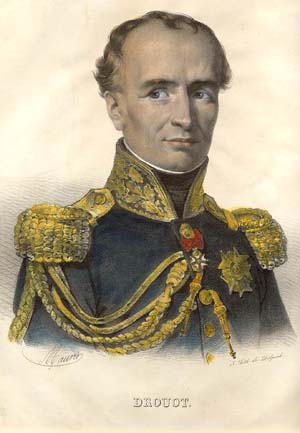The directory «Plots of stamps in the catalogue»
Drouot Antoine
(1774—1847)

Antoine Drouot was born at Nancy on January 11, 1774 to a family of bakers; he was one of 12 children of Claude Drouot. Antoine Drouot wrote: "My parents attempted above all to inspire me with religious feeling and to give me a love of work and virtue." Drouot was a man with Spartan tastes. In order to spare parents' budget, Drouot covered the distance between Nancy to Chalons on foot and entered the exam room wearing his walking clothes. Because of his grades, Drouot was named 2nd lieutenant in the 1st Regiment of Foot Artillery.
Antoine Drouot (1774-1847) had quick mind and was one the most remarkable artillerist the world has ever produced. In 1804, he requested service in Boulogne where Napoleon was creating the Grand Army. In 1805 he was in Cadiz (Spain). Between 1805 and 1807 Drouot managed the arms factory at Maubeuge and factory at Charleville. In 1808 Drouot was promoted to major. In December Drouot became the commander of the Foot Artillery Regiment of the Guard. The Emperor always kept him for great emergencies, and when this stern man received an order to bring up his guns, he moved fiercely and steadily. In 1809 Drouot commanded a hundred gun battery at Wagram which broke the Austrian line. In 1812 he participated in the invasion of Russia and fought at Borodino. In that year Drouot earned the rank of Commander in the Order of the Legion of Honor. In 1813 he was promoted to the rank of general de brigade.
In battle he was often dismounted, in the midst of his guns, dressed in old uniform of general of artillery. He was somewhat superstitious about this uniform.
His quiet and grave demeanor, his steadfastness, reminded one of the strength of his artillery. This monk-general fought at Weissenfels, Lutzen, Bautzen, Dresden and on October 16 at Wachau near Leipzig. Meanwhile he was promoted to the rank of general de division. At Leipzig he commanded a huge battery of 100-150 guns on the Gallows Height. Drouot gained the victory at Hanau in clearing the Bavarians from the road to France. In 1814 Drouot and his artillery fought at La Rothiere, Champaubert, Vauchamp, Mormant, bloody Craonne, Laon, and Arcis-sur-Aube. Among the 2,000 volunteers that Napoleon was authorized to take with him for his guard on Elba Island was Drouot. Drouot participated in the 1815 campaign.
He was a man of honesty, modesty and faithfulness and always carried a Bible with him. Napoleon liked his general very much and appreciated his wisdom and loyalty. In the Will of Napoleon is written: "To General Drouot, one hundred thousand francs."
Ajman, 1971, Return of Napoleon from Elba
Equatorial Guinea, 1977, French campain
France, 1961, General Druot
Fujeira, 1972, Napoleon in Fontainebleau
Fujeira, 1972, Coronation of Napoleon; French campaign
Guinea, 2011, French presidents, Napoleon I
Liberia, 1970, The French Campaign
Manama, 1972, Napoleon in Fontainebleau
Mauritanie, 1969, The Farewell at Fontainebleau
Niger, 1969, French campaign
France,  Paris, post office Drouot
Paris, post office Drouot
France, 1961.05.20,  Nancy. General Drouot
Nancy. General Drouot